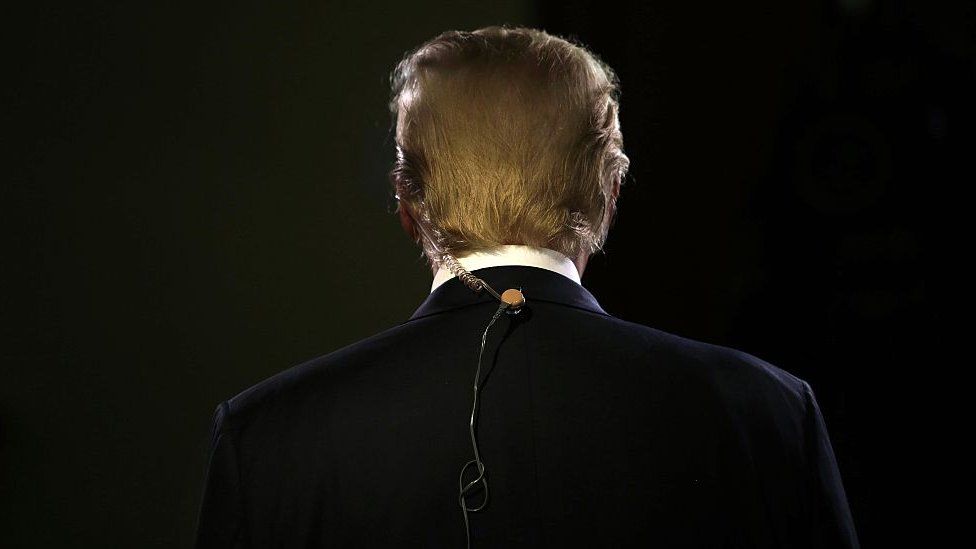Trump or Trumpism? A conservative dilemma
- Published

As Fox News is forced to reassess its role in American political life, it might ask the question, is this White House about Trump or about the movement he stands for, call it Trumpism? There's a difference. It's the same question millions of voters who supported Donald Trump will soon want the answer to.
For the past couple of decades Fox News has dominated the American cable landscape by successfully combining a coherent conservative ideology with top quality television visuals. The political ideology is talked about a lot and was driven by one man, Roger Ailes who became founding CEO of the channel in 1996. His talent for TV is mentioned less often.
This piece is not about the sexual harassment allegations against Bill O'Reilly or Fox's role in putting women in overly sexual roles on air - that's the dark side of Roger Ailes' knack for producing seductive TV.
When I praise Fox's visuals, I'm thinking of the graphics, the maps, the movement, the speed with which they get video up on air and the relentless determination to make sure the screen didn't look dull, even for a single moment.
The network was revolutionary. Yes, Fox could be lampooned for being too whiz-bang, but don't fool yourself, every other TV producer looked at what Mr Ailes was doing back in the 1990s and they were awestruck. They quickly followed suit as far as their own budgets allowed. Imitation is the highest form of flattery.
Now Fox faces a different challenge, how to respond to the man in the White House, and the answer to that lies in the broader determination of what this presidency is really about.
Donald Trump was elected to be a champion of the "forgotten men and women" of America. That was his populist promise. He would revive their economic fortunes and return power to the people.
To do so, he promised to be tough on the countries that had stolen those jobs - primarily China. It was a "currency manipulator", he railed, which "raped" America, didn't play fair and should be slapped with 40% tariffs.
Five Trump changes you may have missed
In the old steel mill towns of Ohio, Pennsylvania, Michigan and even Wisconsin, they nodded with relief. Finally here was someone who said what they had been thinking for years. It was time to get bearish on Beijing. That's a pretty good example of Trumpism.
Candidate Trump ignored the wise old foreign policy hands who said that this strategy was unrealistic and that it would alienate China's co-operation on other issues, namely North Korea. With the arch-populist Steve Bannon whispering in his ear, Mr Trump continued to say what the people wanted to hear, he promised not to be afraid of anyone, not to compromise on their beliefs and always to put America first. The slogans won him the White House.
But once he actually got into the Oval Office and sat behind that historic desk, two things happened to undermine that commitment. First, Mr Trump realised that the world was a lot more complicated than he'd taken time as a candidate to learn. The old hands were right, he did need China to help deal with Kim Jong-un and he wouldn't get that help if he slapped them with tariffs or started a currency war. Second, his approval ratings fell, dramatically.
Although Mr Trump has seen a recent uptick in his poll numbers in the past couple of weeks, he is still at historic lows. This was embarrassing to a man who routinely spent a lot of time in his campaign speeches touting his impressive poll numbers. It was also embarrassing to his family.
The Trumps have built their brand on success. Failure was not a popular option in the family. Inside the White House, the president's daughter, Ivanka, and son-in-law, Jared, realise that for Mr Trump to succeed, Trumpism may have to go. Or at least, be substantially sidelined. The two liberal, cosmopolitan New York Democrats had never been particularly wedded to the hellfire-and-brimstone vision of America that Steve Bannon described in the lines of Mr Trump's inaugural address. Neither of them are natural working-class populists.
As they both formally expanded their roles and their presence in their father's administration, a shift occurred away from protecting the ideology to protecting the man. The risk for Mr Trump is that these policy shifts - on China, the Export Import bank, the currency, Nato - risk disappointing his base.
The latest polls show Mr Trump scoring very badly on questions like "shares my values" or "cares about people like me". Many of these people really want Mr Trump to deliver on his campaign promises, not abandon them.
This is where Fox News comes in. Fox did well out of the Trump campaign. It was firmly in the president's camp and his frequent interviews with the network helped drive ratings which helped drive ad revenue. Throughout the Obama years, Fox was the insurgent network of opposition. Now it needs a new role.
It can be a mouthpiece of the Trump administration (though supporting the government doesn't make for the most gripping cable TV.) Or Fox can stick to its conservative roots and champion Trumpism, even when the man himself does not.